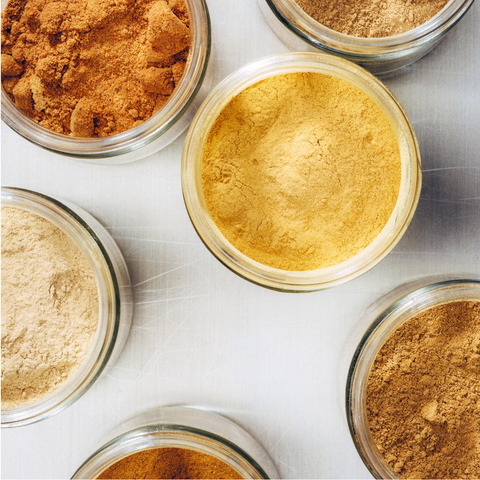You’re in the middle of a task that typically takes no time at all, but today, your mind feels cloudy.
Sound familiar?
Brain fog can get in the way of daily functioning. But how do you go about solving this common yet vague cognitive complaint? In some cases, your brain can benefit from a little boost. Taking the mushroom Lion’s Mane for focus may help clear the fog, promote focus, and improve cognitive health. In fact, it’s one of the best mushrooms for energy and mental clarity.
Below, we dig into the research on this Traditional Chinese Medicine nootropic and help you understand how Lion’s mane is good for focus.
Does Lion’s Mane Help With Focus?
Evidence suggests Lion’s Mane may improve your focus and provide other benefits for your brain health in three main ways.
Enhances memory and focus
A study published in 2015 found that Lion’s Mane contains certain compounds that encourage the production of nerve growth factor (NGF). These compounds may enhance your memory and focus. It’s said that the best time to take Lion’s Mane is in the morning to help reap these benefits and keep the body focused and energized throughout the day.
Improves cognitive function
According to a 2023 study, Lion’s Mane supplements may benefit brain fog and improve cognitive function in young adults. However, this study involved a small sample size, so further research on a larger population is needed to further substantiate these claims on this dietary supplement.
Another research study published in 2009 revealed that taking four 250-milligram (mg) tablets of Lion’s Mane led to mild cognitive improvement among men between 50 and 80.
Grows and repairs damaged nerve cells
One study suggests that this type of functional mushroom, in combination with Coriolus versicolor - otherwise known as Turkey Tail mushroom - may help grow and repair nerve cells after traumatic brain injury (TBI), which may happen due to a stroke, car accident, or fall.
The Science Behind Lion’s Mane and Its Cognitive Benefits
According to a 2023 study, Lion’s Mane draws out the effects of brain-derived neurotrophic factor (BNDF), potentially improving your learning, memory, and processing speed. A brain-derived neurotrophic factor (BDNF) is a protein responsible for neuron growth and survival and is essential for healthy brain function.
Another 2023 study suggests Lion’s Mane stimulates nerve growth factor (NGF) release, which regulates inflammatory processes, lowers oxidative stress, and protects nerve cells from apoptosis (cell death) to achieve neuroprotective effects. Neuroprotection defends your central nervous system against injury from acute and chronic neurodegenerative disorders.
Lion’s Mane mushroom contains several bioactive compounds that support its cognitive benefits, which include:
- Erinacines: Erinacines are naturally neuroprotective against neurodegenerative diseases
- Hericerins: These bioactive compounds activate a pan-neurotrophic pathway in the brain that may enhance your memory and brain function.
- Hericenones: Also known as meroterpenoids, hericenones are aromatic compounds derived from the fruiting bodies of the Lion’s Mane mushroom. They’re known to induce the biosynthesis of nerve growth factor in nerve cells.
- Steroids: They’ve been shown to have anabolic (increases protein synthesis), antidiabetic, pain relieving, anti-inflammatory, and anti-parasitic properties.
- Monoterpenes and diterpenes: Based on animal and cell models, research suggests that monoterpenes may have antitumor activity. They may also have antioxidant and antimicrobial properties. Diterpenes are active compounds with several health benefits, including antimicrobial and antiviral effects. Diterpenes may also help regulate blood sugar.
How to Use Lion’s Mane for Focus
Lion’s Mane is available in many forms, including dried, powder, capsules, and tinctures. The natural focus supplement can be mixed into hot water, coffee, non-dairy milk, tea, smoothies, and other beverages. You can also add it to soups, stews, and salads.
There’s no standard dosage for Lion’s Mane. The authors of one study suggest a dosage of 3–5 grams daily to improve cognition. Other studies have found doses of 1,050 and 1,200 milligrams daily effective for producing cognitive benefits.
Research shows that short-term use of Lion’s Mane has few side effects. However, in some cases, the functional mushroom may cause mild digestive issues, such as abdominal discomfort, nausea, and diarrhea.
Talk to a healthcare professional if you experience any side effects from taking Lion’s Mane.
Looking for other ways to improve your cognitive performance and focus while using a Lion’s Mane supplement? Here are a few suggestions:
- Meditation: Mindfulness may help calm your mind and improve your overall well-being. Evidence also suggests meditation can increase your cognitive function, including attention, memory, and executive function.
- Brain teaser games: According to a 2021 study, Jigsaw puzzles, crossword puzzles, and other brain teasers can enhance the function of your brain’s prefrontal cortex, which plays a significant role in thinking, decision-making, concentration, and problem-solving.
- Learning new skills: A 2023 study involving older adults found that learning multiple skills, such as photography and quilting, may improve cognitive abilities.
The Bottom Line on Lion’s Mane for Focus
If mental fog is getting in the way of your productivity and overall well-being, think about adding a Lion’s Mane supplement to your routine.
Brain Dust® is a nootropic blend of herbs and adaptogens that targets stress to support overall cognitive health. Informed by Traditional Chinese Medicine and Ayurveda, Brain Dust® combines Lion’s Mane with other brain-boosters like Ginkgo, Rhodiola, Ashwagandha, Astragalus, and Maca.
The best way to use this mushroom powder is to add 1 tsp to your beverage of choice. It is best with coffee, tea, chocolate, and milk, but it also works well in smoothies.

Sources
- Aliyari H, et al. (2021). The effect of brain teaser games on the attention of players based on hormonal and brain signal changes. https://www.ncbi.nlm.nih.gov/pmc/articles/PMC8818112/
- Aramsirirujiwet Y, et al. (2023). Benefits of erinacines from different cultivate formulas on cognitive deficits and anxiety-like behaviour in mice with trimethyltin-induced toxicity. https://www.ncbi.nlm.nih.gov/pmc/articles/PMC10583843/#
- Bathina S, et al. (2015). Brain-derived neurotrophic factor and its clinical implications. https://www.ncbi.nlm.nih.gov/pmc/articles/PMC4697050/#
- Brenner EK, et al. (2023). Brain derived neurotrophic factor interacts with white matter hyperintensities to influence processing speed and hippocampal volume in older adults. https://www.ncbi.nlm.nih.gov/pmc/articles/PMC10200154/
- D’Amico R, et al. (2021). Hericium erinaceus and coriolus versicolor modulate molecular and biochemical changes after TBI. https://www.ncbi.nlm.nih.gov/pmc/articles/PMC8228340/
- Docherty S, et al. (2023). The acute and chronic effects of Lion’s Mane mushroom supplementation on cognitive function, stress, and mood in young adults: A double-blind, parallel groups, pilot study. https://www.ncbi.nlm.nih.gov/pmc/articles/PMC10675414/
- Gard T, et al. (2014). The potential effects of meditation on age-related cognitive decline: A systematic review. https://www.ncbi.nlm.nih.gov/pmc/articles/PMC4024457/
- Kushairi N, et al. (2019). Lion’s Mane Mushroom, Hericium erinaceus (Bull.: Fr.) Pers. Suppresses H2O2-Induced Oxidative Damage and LPS-Induced Inflammation in HT22 Hippocampal Neurons and BV2 Microglia. https://www.ncbi.nlm.nih.gov/pmc/articles/PMC6720269/
- Leanos S, et al. (2023). The impact of learning multiple real-world skills on cognitive abilities and functional independence in healthy older adults. https://www.ncbi.nlm.nih.gov/pmc/articles/PMC10394988/
- Lion’s Mane. (2024). https://www.ncbi.nlm.nih.gov/books/NBK599740/
- Martinez-Marmol R, et al. (2023). Hericerin derivatives activates a pan-neurotrophic pathway in central hippocampal neurons converging to ERK1/2 signaling enhancing spatial memory. https://onlinelibrary.wiley.com/doi/10.1111/jnc.15767
- Meditation and mindfulness: What you need to know. (2022). https://www.nccih.nih.gov/health/meditation-and-mindfulness-what-you-need-to-know
- Mori K, et al. (2009). Improving effects of the mushroom Yamabushitake (Hericium erinaceus) on mild cognitive impairment: A double-blind placebo-controlled clinical trial. https://pubmed.ncbi.nlm.nih.gov/18844328/
- Rahman SU, et al. (2017). Bioactive steroids and saponins of the genus trillium. https://www.ncbi.nlm.nih.gov/pmc/articles/PMC6149773/
- Rehman MU, et al. (2019). Neuroprotective strategies for neurological disorders by natural products: An update. https://www.ncbi.nlm.nih.gov/pmc/articles/PMC6425075/#
- Saeidnia S, et al. (2012). Chapter 6–Trypanocidal monoterpenes: Lead compounds to design future trypanocidal drugs. https://www.sciencedirect.com/science/article/abs/pii/B9780444595140000067
- Samberkar S, et al. (2015). Lion’s Mane, hericium erinaceus and tiger milk, lignosus rhinocertotis (higher basidiomycetes) medicinal mushrooms stimulate neurite outgrowth in dissociated cells of brain, spinal cord, and retina: An in vitro study. https://pubmed.ncbi.nlm.nih.gov/26853959/
- Sousa IP, et al. (2018). An overview of biotransformation and toxicity of diterpenes. https://www.ncbi.nlm.nih.gov/pmc/articles/PMC6100218/
- Szucko-Kociuba I, et al. (2023). Neurotrophic and neuroprotective effects of hericium erinaceus. https://pubmed.ncbi.nlm.nih.gov/37958943/#














